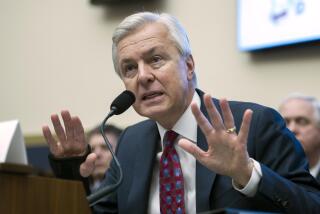Meese Says Hutton Case Sent Warning to Business
- Share via
NEW YORK — U.S. Atty. Gen. Edwin Meese III, stung by criticism for allowing E. F. Hutton to plead guilty to fraud rather than stand trial, said Wednesday that the speedy resolution of the case sent a sharp signal to the financial community and has changed management practices.
In a speech at the Metropolitan Club, Meese said that prosecution of white-collar or economic crimes had increased under President Reagan.
He urged Congress to pass a newly proposed package of bills, which he said would be like “putting Mad Max, Rambo and Mr. T together on the same A-Team. Only this time the A stands for Anti-Fraud.”
Defending his handling of allegations of mail and wire fraud against E. F. Hutton, Meese said federal prosecutors feared that taking the case to court would have been “costly and inefficient and would not have reached the most widespread abuses of Hutton and the rest of the financial management community.”
“Had it failed--a real possibility--the wrong signals would have been sent,” he said.
Critics charged that the Justice Department should have prosecuted individual Hutton officials to reinforce the warning. On the other side, some businessmen and bankers have questioned whether Hutton actually intended to commit fraud through its practices, which included massive writing of overdrafts on bank accounts.
Four months ago, the government accepted Hutton’s guilty plea to 2,000 felony counts. It collected the maximum fine of $2 million, made the company pay $750,000 to cover the cost of the probe and forced it to make immediate and full restitution with interest to each of the banks defrauded, Meese said. The company has set aside $8 million for such payments.
“The significance of the Hutton prosecution has not been lost on the financial community,” Meese said.
“Apparently, money managers are getting that message.”
The attorney general quoted Paul A. Volcker, chairman of the Federal Reserve Board, as attributing a recent $1-billion rise in M1, the basic measure of the nation’s money supply, to widespread changes of cash management stemming from the Hutton case.
More to Read
Get the L.A. Times Politics newsletter
Deeply reported insights into legislation, politics and policy from Sacramento, Washington and beyond. In your inbox twice per week.
You may occasionally receive promotional content from the Los Angeles Times.










